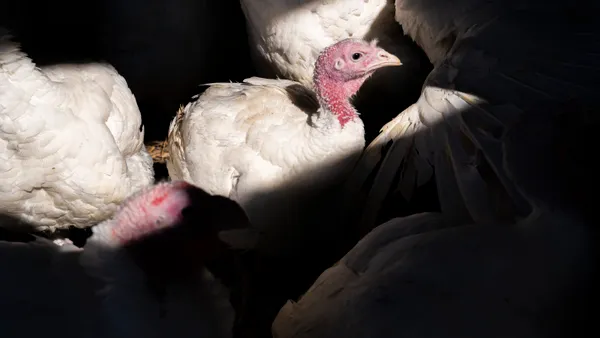Dive Brief:
-
Smithfield Foods is downsizing its operations in Utah as the pork industry grapples with supply-demand imbalances and high feed prices.
-
The nation’s largest pork-producing company last week said it will end contracts with 26 hog farms in the state to improve operational efficiencies. The move will lead to layoffs and eliminations of positions that support contract farm relationships.
-
Up to one-third of Smithfield's 210-person workforce could be laid off, the company said. Smithfield has taken several steps to trim costs this year, such as reducing hog operations in Missouri and closing a production facility in North Carolina.
Dive Insight:
The pork industry is facing one of its worst years on record driven by high supply, soft consumer demand and elevated input costs. This confluence of stressors has eroded hog farmer returns and company profits.
To weather the headwinds, Smithfield President and CEO Shane Smith said the company is taking steps to improve operational efficiency and better utilize its hog supply chain.
"Our industry and company are experiencing historically challenging hog production market conditions," Smith said in a statement. “These are difficult decisions, but they are necessary to help our company remain competitive in this operating environment.”
While the exact number of affected employees was not disclosed, as many as 70 people could be affected by the 26 contract eliminations in Utah. Smithfield said it will offer relocation opportunities for affected workers and provide transitional assistance.
Five company-owned sow farms will continue to operate in the area, according to the Utah Farm Bureau Federation.
“While we understand there are many economic forces at play for Smithfield, it is unfortunate that so many will bear the brunt of these business decisions,” Utah Farm Bureau CEO Spencer Gibbons said in a statement.
Several meatpackers, including Tyson Foods, Smithfield and JBS, have taken steps to cut costs or consolidate operations after reporting consecutive losses this year from the challenging market environment. Under current conditions, hog farmers are not expected to break even until spring of 2024, according to a U.S. Department of Agriculture outlook from October.
After shuttering six chicken plants earlier this year, Tyson Foods last month said it will close two case-ready, beef and pork processing plants in January and continue to evaluate other cost-cutting opportunities in the near future.
WH Group, the parent company of Smithfield, reported a loss of $431 million in its pork division during the first three quarters of 2023, largely due to harsh U.S. conditions that have fueled recent downsizing.
This is not the first time Smithfield has shrunk its operational footprint in Utah. The company last year closed a majority of its pork production in Beaver County, Utah, where it was the largest employer, sparking local outcry and an economic state of emergency from the county commission.











